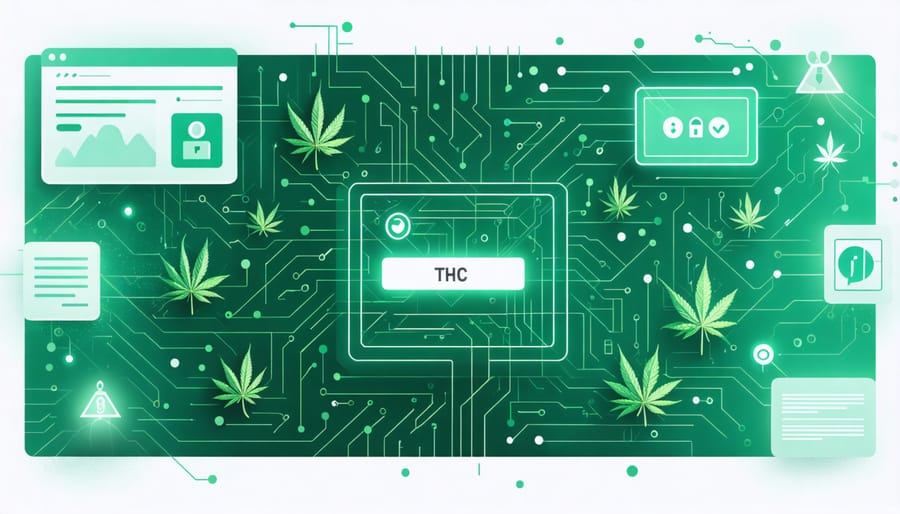To assess user behavior impacts due to THC consumption, establish robust monitoring protocols in your cybersecurity systems. Identify patterns that might emerge from altered decision-making capabilities by evaluating device usage trends linked to THC, for instance, by considering data from sources such as push disposable products, to anticipate potential security vulnerabilities. Implement regular training sessions for employees, focusing on awareness about how substances like THC can impact their professional judgment and technology use. Enhance security measures by introducing layered authentication processes to safeguard sensitive data against unintended leaks or breaches potentially influenced by usage behaviors.
Understanding THC and Its Effects
What is THC?
Tetrahydrocannabinol, or THC, is the primary psychoactive component found in cannabis, responsible for most of the plant’s psychological effects. In recent years, the legalization of cannabis containing THC has been rapidly expanding across various states and countries, impacting both recreational and medicinal use. While some regions allow limited legal use, others maintain strict prohibitions, creating a diverse legal landscape where individuals must be informed of local laws. The prevalence of THC use is on the rise, as seen in increasing cannabis consumption statistics. Understanding these dynamics is crucial for cybersecurity professionals assessing how THC might influence user behavior and decisions online.

THC’s Influence on Cognition
THC, the primary psychoactive component of cannabis, can significantly impact cognitive functions critical to cybersecurity tasks. Its influence on decision-making is noteworthy; users may experience impaired judgment, leading to potential mistakes or risky behaviors. This is particularly crucial when handling sensitive data or responding to cybersecurity threats, where precision and sound reasoning are paramount. THC can also alter perception, affecting how individuals interpret and process information. For cybersecurity professionals, such alterations could result in misinterpreting cyber threats or the effectiveness of security measures. Alertness is another crucial area affected by THC. Reduced alertness could delay response times during security breaches, compromising the integrity of data protection efforts. In environments where vigilance and rapid decision-making are vital, understanding THC’s effects is essential for managing risks. Implementing strategies to mitigate these cognitive impacts can help maintain robust cybersecurity defenses, ensuring that operational security remains uncompromised despite potential challenges presented by THC use.
Cybersecurity Risks Related to THC Usage
Increased Vulnerability to Social Engineering
THC consumption can significantly amplify one’s vulnerability to social engineering strategies, such as phishing attacks, due to its impact on cognitive functions. These substances, often linked to lifestyle choices akin to using vapes and computer hacking, can impair judgment and slow reaction times, making individuals more susceptible to deception. The psychoactive effects of THC can blur decision-making processes, increasing the likelihood of clicking on malicious links or giving away sensitive information without adequate scrutiny. In cybersecurity contexts, attention to detail is crucial, and even a momentary lapse can lead to significant compromises in security. Cybercriminals frequently exploit these vulnerabilities, tailoring attacks towards users less capable of identifying threats. Combining THC use with online activities requires heightened awareness to mitigate such risks. Implementing safeguards, like two-factor authentication and regular security training, becomes vital for maintaining robust defenses against social engineering manipulations in this altered state.

Risks to Data Privacy and Protection
The use of THC can significantly affect data privacy and protection by impairing judgment and concentration. When individuals under the influence engage in online activities, their decision-making capabilities may be compromised, making them more susceptible to phishing scams, weak password choices, and inadvertently sharing sensitive information. Such lapses can lead to unauthorized access to personal data, resulting in potential breaches of privacy and security. THC’s impact on short-term memory and attention to detail further exacerbates these vulnerabilities. Users may overlook critical security alerts or neglect to log out of important accounts, inadvertently leaving digital doors wide open to potential threats. It’s crucial for tech-savvy individuals and cybersecurity professionals to recognize these risks and implement strategies to mitigate them, such as engaging in digital activities only when sober and using robust cybersecurity tools regardless of one’s state of mind. By understanding these risks, users can take proactive steps to safeguard their personal and professional information in an ever-evolving digital landscape.
Case Studies and Incidents
In recent years, several cybersecurity incidents have underscored the subtle yet significant impact of THC on cyber vulnerabilities. For instance, an IT administrator in a financial firm faced disciplinary action after a serious data breach was traced back to impaired decision-making while under the influence of THC. The compromised data resulted from overlooking crucial security updates, highlighting how drug-induced cognitive impairment can exacerbate vulnerabilities in cyberspace. Another incident involved a software developer who, due to THC-related distractions, failed to secure critical API keys, exposing sensitive client information. These cases illustrate how THC can undermine alertness and operational performance, leading to security lapses. To mitigate these risks, organizations are exploring stricter policies on substance use during work hours and enhancing employee cybersecurity awareness. By understanding the connection between THC use and cybersecurity threats, professionals can develop informed strategies to safeguard digital ecosystems against the risks posed by impaired judgment and reduced vigilance.
Mitigating the Risks: Best Practices
Strategies for Individuals
THC use can subtly influence decision-making and attention, potentially leading users to overlook important cybersecurity practices. To mitigate these risks, it’s essential to adopt strong cybersecurity hygiene and personal accountability measures. Firstly, setting up multi-factor authentication adds an extra layer of protection to your accounts, reducing vulnerability if you inadvertently use weaker passwords while under the influence of THC. Regularly updating passwords ensures they remain strong and unique.
Stay vigilant about phishing schemes, as altered judgment can make deceptive emails or messages appear legitimate. Consider installing reputable security software that includes real-time protection and alerts for suspicious activities. Embrace digital mindfulness by periodically assessing and organizing your digital footprint; this includes removing outdated information and simplifying privacy settings. In practice, proactive personal accountability involves a deliberate “pause and think” strategy before responding to prompts online, especially when using THC.
Further, ensure that access to devices is restricted through biometric authentication or robust passcodes, which can act as a deterrent even during lapses in your concentration. Responsible usage combined with discipline in digital practices can significantly reduce your exposure to risks, maintaining both your cybersecurity and privacy integrity.
Organizational Policies and Protocols
To mitigate the cybersecurity risks posed by employees using THC, organizations should implement comprehensive policies and protocols. First, it’s essential to establish clear guidelines around THC use, particularly within workspaces where sensitive data is handled. Employers might consider creating educational programs that underscore the potential impact of THC on cognitive abilities such as concentration and decision-making, which are crucial for maintaining robust cybersecurity defenses.
Additionally, regular training sessions on maintaining staff safety online can foster a culture of vigilance. Employers should encourage open communication to ensure employees feel comfortable discussing any issues related to THC use that might affect their work. Implementing strict access controls and monitoring systems can help detect unusual digital activities that might indicate compromised user behaviors.
Periodic evaluations of employee performance and responsiveness to cybersecurity protocols can also be beneficial, ensuring that staff adhere to best practices. Leveraging technology that can provide real-time alerts and secure access portals is also recommended. By adopting a proactive and non-punitive approach, organizations can help employees understand the balance between personal choices and professional responsibilities, thereby minimizing potential security risks associated with THC consumption.

Beyond THC: Broader Implications for Cybersecurity and Policy
Legislative and Regulatory Considerations
As the legal landscape surrounding THC evolves, so too must legislative and regulatory frameworks adapt to address its potential impact on cybersecurity risk. Policymakers may find it necessary to reevaluate existing drug policies, especially in sectors dealing with sensitive data. Increased THC consumption could impair cognitive functions and decision-making, which may inadvertently heighten vulnerability to cyber threats through reduced security awareness. Governments and organizations may need to introduce policies that provide guidance on THC use in industries critical to national security and data protection.
There is also the potential need for updated workplace regulations that recognize THC’s legal status while ensuring that employees in cybersecurity roles remain alert and effective. Employers might consider regular training and awareness programs to mitigate risks associated with impaired judgment. The intersection of evolving marijuana legislation and cybersecurity thus presents a complex challenge where privacy, personal choice, and security must be carefully balanced. This underlines the importance of developing informed, flexible policies that can adapt to ongoing changes.
Future Directions in Research and Policy
Emerging research into the impact of THC on cybersecurity risk reveals several insightful avenues for both understanding and mitigation. One area of focus is the cognitive effects of THC, which can alter user behavior and potentially increase vulnerabilities to cyber threats due to impaired decision-making and slower response times. Future studies should delve into how these cognitive shifts specifically affect interactions with digital security measures and the extent to which habitual use might exacerbate risks.
From a policy perspective, it is crucial to balance the growing legalization and use of THC with robust cybersecurity education and awareness programs. Policymakers should consider creating guidelines that inform users about potential risks associated with under-the-influence online activities, promoting safer digital habits. Furthermore, workplace policies could be developed to address THC use thoughtfully, ensuring that organizations maintain security without infringing on personal freedoms. As this field evolves, cross-disciplinary research will play a pivotal role in designing effective strategies that protect digital spaces while respecting individual rights.
Conclusion
In conclusion, understanding the impact of THC on cybersecurity risk involves exploring how THC use may alter user behavior and potentially increase vulnerabilities. While THC can affect cognitive functions such as decision-making and attention to detail, which are crucial when interacting with digital systems, it is essential for individuals and organizations to be aware of these potential risks. As society grapples with internet surveillance concerns, the implications of THC use on cybersecurity require careful consideration to ensure optimal protection of sensitive information. A balanced approach is needed, focusing on education around safe online practices and regular assessments of security protocols to mitigate risks associated with impaired judgment. Ultimately, it is a matter of individual responsibility coupled with organizational accountability to foster a secure digital environment, mindful of how lifestyle choices like THC consumption may intersect with digital security practices.


